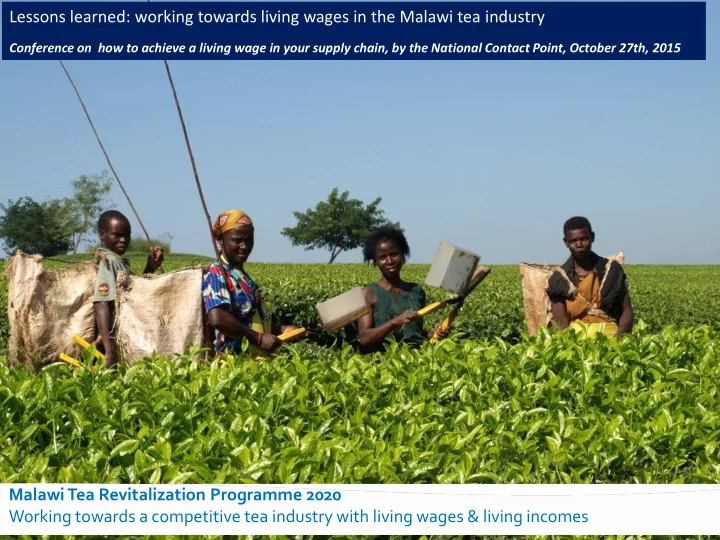

Lessons learned: working towards living wages in the Malawi tea industry Conference on how to achieve a living wage in your supply chain, by the National Contact Point, October 27th, 2015 Malawi Tea Revitalization Programme 2020 Working towards a competitive tea industry with living wages & living incomes
Steps taken in tea supply chain on living wage Year Milestone 2007 NGO activism on low wages in the tea industry 2011 Multi-stakeholder collaboration started to understand wages in the tea industry 2013 Report released on ‘ understanding wages in the tea industry ’; tea industry accepted findings and agreed to take action in Malawi 2014 Living wage benchmark for rural Malawi calculated per Anker methodology; conversations with producers in Malawi intensified; agreement that living wage debate needs to include the competetiveness of the Malawi tea sector. 2015 Supply chain commitment on living wage agreed; Malawi tea revitalization Programme started 2020 Target to reach living wage for tea workers in Malawi
Supply Chain commitment
Malawi Tea – Competitive Analysis Strengths Weaknesses Low production costs / break-even point Low prices Relatively high yields Low perceived quality SADC duty advantages Seasonality (reduces quality and capacity Red colour for certain markets utilisation) Cost effective blend component Aging tea bushes (replanting is too slow) Cost of inbound/outbound logistics Access to and cost of finance Costs of doing business (utilities, services, spares) Power outages Under fertilising Opportunities Threats Replanting higher yielding/quality clones inc Reduced customer base due to reputational drought tolerance risks Better quality leaf from existing bushes Changing weather patterns Irrigation to extend growing season and increase ‘Imposition’ of unsustainable wages yields Extended/more frequent low prices periods Worker productivity inc longer term mechanisation Longer term shortage of labour Revitalisation programme Smallholder Tea Farmers (yields, quality, incomes) New markets inc. local sales Diversification
15 15/16 16/17 17/18 19/20 Thriving Sustainable Tea Industry in Malawi Profitable estate sector investing in its future Support to industry on HR development (WUSC volunteer?) Significant progress towards a living wage Healthy, motivated Profitable productive workforce with smallholder sector greater opportunities for investing in its women future
Draft Roadmap to date 2015 2016 2017 2018 2019 2020 Acceleration Continued Assessment of finance Thriving Sustainable of replanting investment in quality options to support Tea Industry and clonal and factory clonal replanting and in Malawi development improvements engagement with Profitable estate finance institutions sector investing in its future Sustainable procurement Skills Smallholders getting commitments voluntarily Costed development larger share of made agreed with interested options to programme for tea price through good buyers improve workers prices for quality tea nutritional and equity stake in value of production facilities Introduction of improved midday Financial meals meal for training workers for CBA negotiated workers between workers and Capacity building of and employers facilitating unions, employers Engagement with Significant progress access to and government to Programme to producers, smallholder towards a living wage financial improve wage eradicate associations and financial services setting process and discrimination institutions on increased worker and harassment value sharing with Expansion of Farmer representation & identify and smallholders and equity Field Schools to develop capable stakes in factories Support Analysis of options for improve yields, and female workers to improving in-kind quality, business industry benefits HR skills and diversify on HR assessment income Living income practices benchmark Links to GIZ Healthy, motivated Profitable developed and Healthcare strategy for productive workforce with smallholder sector Programme progression greater opportunities for investing in its made towards it women future
Key lessons learned • Wages are complicated; not a ‘ simple compliance’ issue • Need to create a common truth and share ambitions and concerns; wage ladders and living wage benchmarks help • Sector wide collaboration is key; individual projects are not enough. Involve producers and unions from the start • We are talking business, which means that the bottom line should be guaranteed for producers. Seek opportunities to combine living wage agenda with investment agenda • Government and union endorsement is very important; living wage might mean increased mechanisation, redundancies and unemployment
Recommend
More recommend